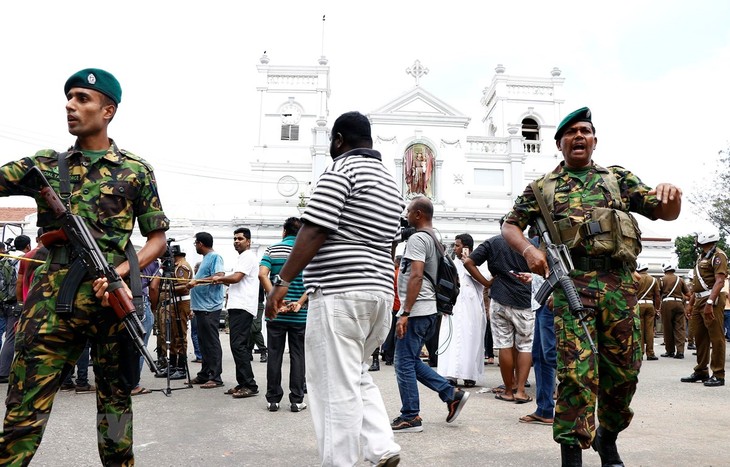(VOVWORLD) - The world has been shocked by a series of devastating terrorist attacks in Sri Lanka, a decade after the civil war ended there. It’s not merely Sri Lanka’s affair. The attacks appear linked to international terrorism, alerting all countries be more vigilant.
 Sri Lankan security force outside a church in Colombo after bomb attacks on April 21, 2019. (photo: THX/VNA) Sri Lankan security force outside a church in Colombo after bomb attacks on April 21, 2019. (photo: THX/VNA)
|
On Easter Sunday, coordinated bomb attacks killed nearly 300 people in churches and luxury hotels in Sri Lanka. They were bloodiest bomb attacks targeting civilians since Sri Lanka’s 26-year civil war ended in 2009. On Monday a van parked near St. Anthony church in Colombo exploded while bomb squad officials were trying to defuse a bomb found at the site. It was an unhappy reminder for many of Sri Lanka’s recent history of violence, which killed 100,000 people.
Links to international terrorism
A day after the bomb attacks, Sri Lankan officials said that the little-known Islamist group National Thowheeth Jama’ath (NTJ) was the culprit and it was backed by an international terrorist network. NTJ was blamed for damaging Buddha statues last year. Since then it had not been tied to any major terrorist attacks. Sri Lankan officials said the NTJ was unable to organize and carry out the bomb attacks that have occurred at other Christian sites.
Analysts have not excluded the possibility that the Islamic State was behind these attacks, aiming to restore its reputation after being driven out of Iraq and Syria. The NTJ attacks displayed all the characteristics of IS, which often brutally targets civilians. They always chose famous sites where many local people and tourists gather. Information sources from Sri Lanka’s Islamic community say that NTJ publicly supports IS, and NTJ founder Zahran Hashim has been accused of being a bomber.
New disputes
Sri Lanka has a long history of fighting terrorism and extremism. The seeds of disputes can easily sprout up in a multi-religious and multi-ethnic country. Christians make up 7 to 8% of the population, Muslims 10%, Hindus 13%, and the rest are Buddhists. The cause of the coordinated attacks was unclear, but analysts said the attacks might ignite new sectarian disputes in Sri Lanka.
Internationally, the attacks in Sri Lanka should alert other countries that IS’s defeat in the Middle East doesn’t mean they have been eliminated. Indonesian police have prepared for possible attacks mimicking the multiple attacks in Sri Lanka. Monitoring and surveillance of "sleeper terrorist cells" have been intensified. Washington says Islamic extremists are a global threat and the US will continue to fight them.